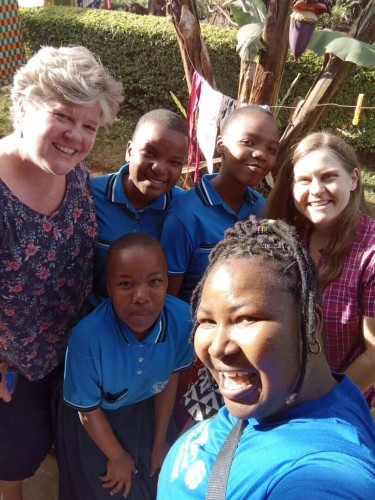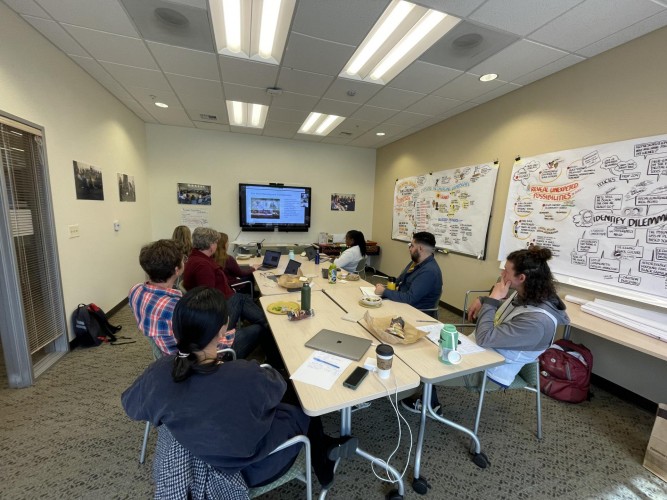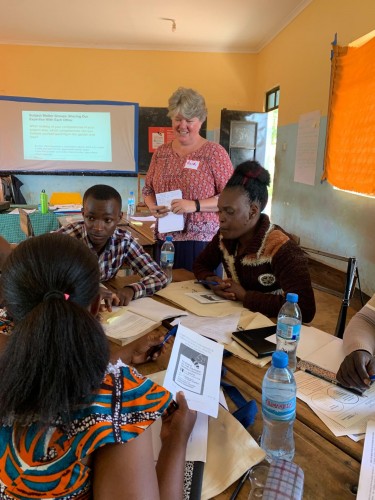From California to Tanzania and Back Again
Creating an educational and culturally-relevant environmental monitoring program for youth in northeast Tanzania
Could Community and Citizen Science not only support Science AND English teachers to teach in hands-on ways, but also help to feed students in Tanzania schools? Based on our recent collaboration, the answer is Yes!
 In the face of continuing public
distrust of science, even whilst environmental crises caused by
climate change increase exponentially, involving young people in
environmental science that can lead to real actions offers a
unique educational approach, especially in schools. In the
case of Tanzania, additional nationwide concerns for children’s
health and nutrition mean that secondary school administrators
and teachers are now being asked to provide not only science and
English language instruction (mandatory starting at the secondary
grades), but also to install and maintain school gardens to
provide students with nutritious vegetables. In this context, the
Center for CCS’s Heidi Ballard and Peggy Harte have begun a
collaborative program with Catherine Njau, English teacher,
teacher trainer and founder of Kuleana Youth Empowerment in
Kilimanjaro region, to bridge all these needs through CCS in
school gardens in Tanzania.
In the face of continuing public
distrust of science, even whilst environmental crises caused by
climate change increase exponentially, involving young people in
environmental science that can lead to real actions offers a
unique educational approach, especially in schools. In the
case of Tanzania, additional nationwide concerns for children’s
health and nutrition mean that secondary school administrators
and teachers are now being asked to provide not only science and
English language instruction (mandatory starting at the secondary
grades), but also to install and maintain school gardens to
provide students with nutritious vegetables. In this context, the
Center for CCS’s Heidi Ballard and Peggy Harte have begun a
collaborative program with Catherine Njau, English teacher,
teacher trainer and founder of Kuleana Youth Empowerment in
Kilimanjaro region, to bridge all these needs through CCS in
school gardens in Tanzania.
Recently the Center had the pleasure of hosting Catherine in-person in Davis, California for a Collabinar event where she and Peggy Harte and Heidi Ballard shared the project’s progress so far and workshopped next steps with the group.
In October 2022 Peggy and Heidi traveled to the Kilimanjaro region of Tanzania where they met (for the first time in person) their collaborating partner, Catherine Njau. Funded by a UC Davis Global Affairs Seed Grant, the team was able to support the efforts of educators in the Kilimanjaro region with both time and resources. Before the visit. Catherine reached out to 5 sites that she had supported to get gardens up and running and 5 sites where gardens were planned but not yet developed. The goal was to involve 1 science teacher and 1 English teacher from each of 10 sites as a way to support the current model for English language instruction and development as well as science instruction. Tanzanian schools instruct in Kiswahili in elementary school, transitioning to 100% instruction in English in all core subjects in secondary schools. This is a difficult transition for students as well as teachers, focusing on both language instruction as well as finding ways to deepen student engagement with the content.
 During the Collabinar at the Center
ar UC Davis, the team shared the highlights and challenges of
their work together in October, which focused on 1) visiting the
5 schools with established gardens where students and teachers
demonstrated how they built and maintain the gardens, and then 2)
bringing the nearly 20 teachers Catherine had recruited together
for an all-day professional development workshop where the three
collaborators lead activities indoors and in the garden focused
on supporting the teachers to use the garden context to teach
science and English content and practices. This was a very new
approach for most teachers, who had previously only asked
students to work in the garden as a service to the school. By the
time of the final activities, teachers were noticeably excited as
they worked with peers from each discipline with their respective
National curriculum to integrate garden-based concepts and
practices into their lesson planning. They also came away from
the workshop enthusiastic about the potential for teaching
students about how they can monitor pollinators and other
biodiversity in their own gardens and submit the data through
platforms like iNaturalist to enhance science and English
language practices.
During the Collabinar at the Center
ar UC Davis, the team shared the highlights and challenges of
their work together in October, which focused on 1) visiting the
5 schools with established gardens where students and teachers
demonstrated how they built and maintain the gardens, and then 2)
bringing the nearly 20 teachers Catherine had recruited together
for an all-day professional development workshop where the three
collaborators lead activities indoors and in the garden focused
on supporting the teachers to use the garden context to teach
science and English content and practices. This was a very new
approach for most teachers, who had previously only asked
students to work in the garden as a service to the school. By the
time of the final activities, teachers were noticeably excited as
they worked with peers from each discipline with their respective
National curriculum to integrate garden-based concepts and
practices into their lesson planning. They also came away from
the workshop enthusiastic about the potential for teaching
students about how they can monitor pollinators and other
biodiversity in their own gardens and submit the data through
platforms like iNaturalist to enhance science and English
language practices.
 This workshop was an important first
step in the Center’s effort to develop an educational and
environmental monitoring program that has the long-term potential
of engaging youth and their communities in learning about local
environmental and agro-ecological issues, science reasoning
practices, and English literacy while also addressing food
security and gender equity educational opportunities for both
youth and their teachers.
This workshop was an important first
step in the Center’s effort to develop an educational and
environmental monitoring program that has the long-term potential
of engaging youth and their communities in learning about local
environmental and agro-ecological issues, science reasoning
practices, and English literacy while also addressing food
security and gender equity educational opportunities for both
youth and their teachers.
We are excited by ideas generated during the two exchange visits about next steps, ongoing collaboration and future opportunities for this program. More to come!








